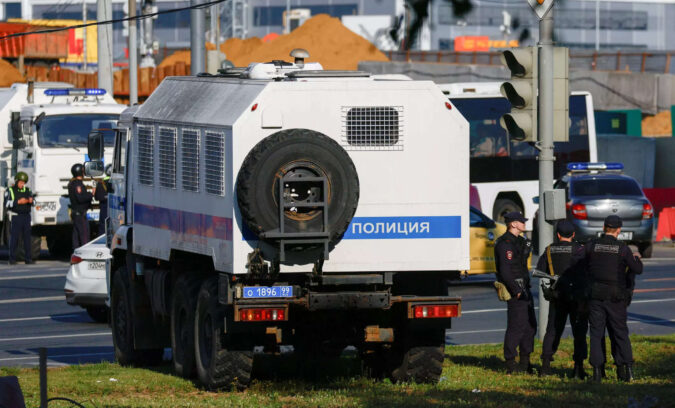MOSCOW: An “anti-terrorist operation regime” was still in force in Moscow on Sunday, a day after mutinous Wagner mercenaries threatened to storm the Russian capital, in a dramatic security crisis for President Vladimir Putin.
The Kremlin announced Saturday that Wagner chief Yevgeny Prigozhin who led the rebellion will be sent to Belarus after mediation by Minsk leader Alexander Lukashenko.
Prigozhin’s whereabouts were unknown on Sunday, but Moscow said the “armed rebellion” charges against him will be dropped and his fighters will also not be prosecuted.
Prigozhin, who was updating the public on Wagner’s mutiny via audio messages on Telegram on Saturday, had not yet said when he will leave his country for Kremlin-allied Belarus.
The anti-terrorist regime was introduced in Moscow on Saturday, as Prigozhin’s forces appeared to advance on the capital, with authorities asking residents to limit travel.
Moscow authorities also said that a day off work introduced to curb movement around the city on Monday would remain in place for security reasons.
In the southern city of Rostov-on-Don, which Wagner fighters left late on Saturday after taking the main army HQ there, traffic resumed as normal, Russian state media reported.
It showed workers clearing the streets outside the military headquarters and outside the local circus gates, where a tank had got stuck the day before.
Authorities in the Kaluga region, south of Moscow, said Saturday they were starting to lift road restrictions introduced to stop the Wagner rebellion.
In the southern city of Voronezh, where the army said it was leading “combat” a day earlier, emergency services they put out a huge fire at an oil depot that burned during the mutiny.
Authorities had not explained the cause of the fire, with images on social media showing a large black cloud of smoke. Some Russian media reported there was a helicopter nearby before an explosion in the area.
The Kremlin announced Saturday that Wagner chief Yevgeny Prigozhin who led the rebellion will be sent to Belarus after mediation by Minsk leader Alexander Lukashenko.
Prigozhin’s whereabouts were unknown on Sunday, but Moscow said the “armed rebellion” charges against him will be dropped and his fighters will also not be prosecuted.
Prigozhin, who was updating the public on Wagner’s mutiny via audio messages on Telegram on Saturday, had not yet said when he will leave his country for Kremlin-allied Belarus.
The anti-terrorist regime was introduced in Moscow on Saturday, as Prigozhin’s forces appeared to advance on the capital, with authorities asking residents to limit travel.
Moscow authorities also said that a day off work introduced to curb movement around the city on Monday would remain in place for security reasons.
In the southern city of Rostov-on-Don, which Wagner fighters left late on Saturday after taking the main army HQ there, traffic resumed as normal, Russian state media reported.
It showed workers clearing the streets outside the military headquarters and outside the local circus gates, where a tank had got stuck the day before.
Authorities in the Kaluga region, south of Moscow, said Saturday they were starting to lift road restrictions introduced to stop the Wagner rebellion.
In the southern city of Voronezh, where the army said it was leading “combat” a day earlier, emergency services they put out a huge fire at an oil depot that burned during the mutiny.
Authorities had not explained the cause of the fire, with images on social media showing a large black cloud of smoke. Some Russian media reported there was a helicopter nearby before an explosion in the area.
